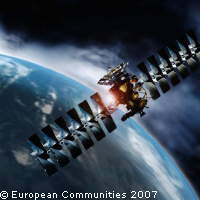EU approves extra public funds for Galileo and EIT
EU ministers have agreed to the full public financing of the Galileo satellite system and the brand new European Institute of Innovation and Technology (EIT), as part of a deal on the EU's €120 billion budget for 2008. Following the collapse of talks between the companies involved in the public-private partnership responsible for the deployment phase of Galileo, Member States agreed on 23 November to fund the project from the Community budget. Galileo, the 30-satellite navigation system designed to rival the US global positioning system (GPS), will receive an additional €2.4 billion to that originally planned. Some €1.6 billion will come from unspent farm subsidies and €400 million from the budget foreseen for transport and space research activities under the Seventh Framework Programme (FP7). The rest will come from the redeployment of funds within the budget. 'The Portuguese Presidency is very pleased with the agreement that was established last Friday among the Member States of the European Union to unblock the financing of two fundamental initiatives for Europe, the Galileo project - the European system of satellite radio-navigation - and the European Institute of Technology,' said Manuel Lobo Antunes, the Portuguese Joint Secretary of State and for European Affairs. According to Mr Lobo Antunes, the agreement between the 27 EU Member States was one of the most complicated issues on the agenda of the Portuguese Presidency of the EU, and one of its priorities. As the biggest contributor to the EU budget, Germany, had strongly opposed funding from unspent farm subsidies, fearing it would set a precedent for not giving unspent farm money back to national capitals. This was in spite of a declaration that it will be an 'exceptional measure'. The plan to kick-start the satellite system with an extra financial injection from public monies was proposed by the European Commission in June. The European Parliament voted in October in favour of funding Galileo solely through the Community budget. According to the Commission, Galileo could generate billions of euros in revenue, create thousands of jobs and keep European companies at the technological cutting edge. The European Institute of Technology (EIT), another flagship project that has been championed by Commission President José Manuel Barroso, is also in need of Community funding if it is to get off the ground. Finance ministers gave the green light to an extra €309 million from various existing budgetary chapters so that the new body can start work during 2008. Mr Barroso welcomed the budgetary deal, saying that the two projects 'will foster innovation, technological progress and competitiveness across the whole EU'. 'This is a budget for a Europe of results,' Mr Barroso added. Altogether, the EU plans to spend €120.3 billion next year, which represents 0.96% of the bloc's gross national income.



